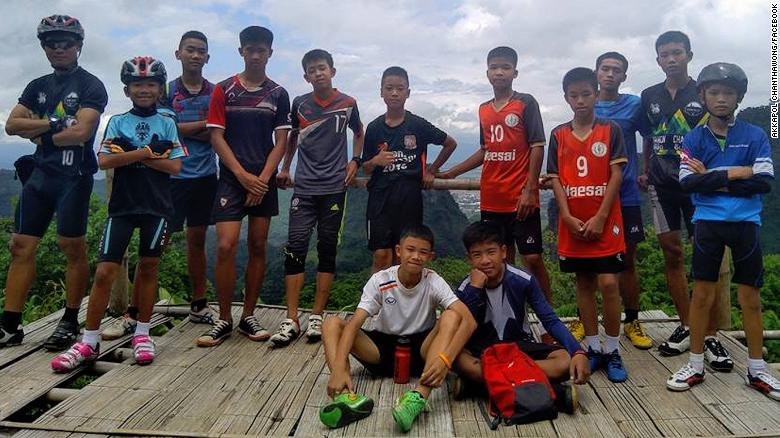Last updated on August 21st, 2018
The world watched breathlessly after the Wild Boars soccer team of 12 boys and their 25-year-old coach were discovered on a ledge deep inside the Thailand cave ten days into their ordeal. They were out of food, they had no light as their flashlights were dead, and they had survived by licking water from the walls. Although thinner, they were in decent shape, yet news outlets conveyed that there was a “sliver of a hope” that the team and their coach would get out alive. The Wild Boars and their rescuers prevailed. All but one person, a dedicated Thai Navy Seal, survived.
This is a story in part about the power of team work. There are many lessons to be learned about what it means to be a member of a high-performing team from this compelling story that had most of us riveted to our favorite news outlets.
There are lessons from the Wild Boars, who survived because of their resilience and teamwork, as well as lessons from the spontaneously formed, international team of experts and volunteers who worked together tirelessly to get the players and their coach out of a nearly impossible situation.
Lessons from the Wild Boars and Their Coach
Many of the boys were already quite resilient, as some were refugees who had learned from a young age to rely on themselves and to trust others in addition to their families. The young coach, an orphan himself at a young age, had spent several years in his youth at a Buddhist monastery where he had learned meditation. The coach taught the boys to meditate, which helped them to remain positive, hopeful, and calm, while they waited those ten long days to be found, awaited an exit strategy to be decided once found, and even while exiting the cave partially submerged wearing oxygen masks.
Obviously, the boys and their coach were a soccer team. One reason I love the game of soccer is that although there are assigned positions, the players truly create the game in the moment. The fluidity of the game actually promotes leadership, teamwork, and resilience. The creativity inherent in soccer (or as the rest of the world calls it “football”) is one reason it is called the “beautiful game.” In soccer, it is not about how many star players you have; it is about the team and how team members work together. In fact, research shows you can have too much talent in every sport except baseball. Too many stars result in unhealthy competition within the team.
In sum, these are resilient boys who relied on the leadership of their coach to assist them in harnessing their skills and strengths for survival. They did not panic or lose hope, and they supported each other. They figured it out and adapted as they went along, just as they do on the field.
An International Team of Experts and Volunteers
The “team” of people who helped the Wild Boars escape from the cave consisted of hundreds of professionals and volunteers from dozens of countries. Some were experts on caves and cave rescues, some were medical experts, and many were volunteers or people with resources to donate. Different individuals were “in charge” of various aspects of the rescue and no one person was calling all the shots—a lot like the way in which a soccer game evolves on the field. Decisions were made in the moment with the team at hand. For example, when the rescuers were bringing the 11th boy out, the cave began to flood again with oxygen levels becoming dangerously low. Again the rescuers were compelled to improvise, to figure out what to do in the moment
Additionally, the cave rescue was an international effort with people who spoke many different languages and were from various traditions and cultures.
There were subject matter experts from a variety of fields (from medicine to spelunking) and there were many different opinions on the best strategies to employ (e.g., “Should we wait for four months until the rainy season is over?” Or “Should we teach the boys to swim?”). Still, they worked together well.
A Common Purpose
Issues that typically plague teams in organizations—such as silos or problems with ego, status, and laziness did not happen here. In work settings, we frequently hear, “That’s not in my job description,” or “I am doing more work than my office mate is doing,” or “I should get more credit because I did more of the work.”
These types of “people” problems are common on typical work teams. Such issues played no known role on the teams that laid hoses in the cave, attached hooks to the ceiling for ropes, administered oxygen to the boys, waited in the cave with the boys, provided the sustenance, or accompanied the boys on stretchers by swimming underneath them or alongside. Why? Because when a team is involved in life and death work, the way that firefighters, soldiers, police, and operating room teams typically function, there is a crystal clear purpose and the realization that we are in this situation together. The “rescuers” and “helpers” who came from all over the world had a mission in which time was of the essence and there was little to no room for error; there was no time for politics.
What Can We Learn from The Miraculous Cave Rescue?
Thankfully, even though most of us do interesting and meaningful work, it may not be work that requires moment-to-moment life and death decisions. So how do we work together better when our jobs do not present a crisis or an emergency?
- Remember the lessons of “the beautiful game”—there is a balance between being known as reliable for serving in the role that only YOU can fulfill and a willingness to assist and help out as needed outside your area. Do both!
- Communication is the key! On the soccer field, team members must let each other know if they are going to take the ball. Such communication reduces on-field collisions and enhances the ability to drive to the goal.
- Don’t take things personally! We are going to step on one another’s toes now and then accidentally. Get over it! If need be, apologize and move on. There is a job to be done!
- Remember that we all have a role to play—find your unique way to contribute. Also, let others add value where they will make their specific contributions.
- Focus on the purpose and desired outcome—that is what matters. Align around a common goal and create agreements about how we will resolve differences of opinion when needed.
- Vigorously debate ideas so the best approach will surface and hopefully stick. Don’t avoid or shut down debate just because it gets intense.
- Remember that you can’t win unless you are resilient—which means being open to various solutions and remaining calm, courageous, and present.
- Just like we learned in kindergarten, share—your knowledge, your help, your humor, your heart, and even your food. The coach made sure everyone else ate before he did. Feed others first.
There is so much to learn from the cave rescue of the Wild Boars—stay tuned for a Part Two on using resilience and mindfulness to succeed!







Great article and message, Chris! Thanks for sharing. Have a great day!
Thanks, Gloria–I appreciate the feedback! I hope you had a great summer. All the best!